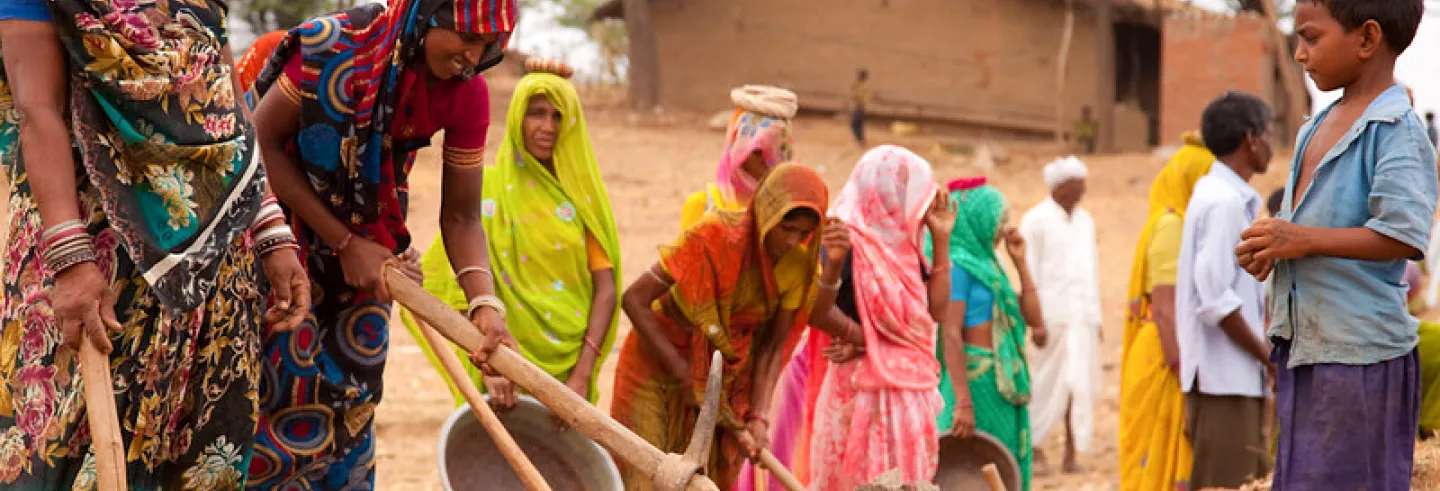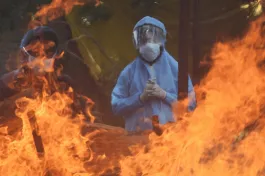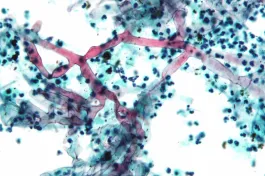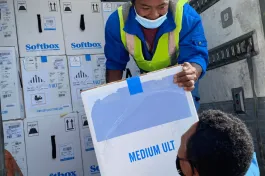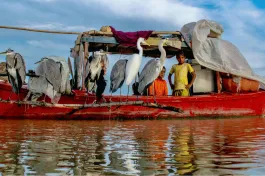Surendar Yadav from Ghazipur, Uttar Pradesh, managed to get a Mahatma Gandhi National Rural Employment Guarantee Act (MGNREGA) job card just before the Covid-19 lockdown imposed in March 2020, but over the next six months, was not able to find work through the scheme.. Durgvijay Chauhan, also from Ghazipur, could not get his PM-KISAN entitlements during the lockdown because a wrong bank account was linked to his name. A group of Dalit women told Mobile Vaani that they did not get benefits from the Public Distribution System (PDS) offered by the government during the lockdown because they could not get enrolled for PDS.
“We can’t work [during the lockdown], we have no money, we are famished; what do we do?” — A Dalit woman, in an interview with Mobile Vaani
Even as the Indian economy and society reels from the effects of Covid-19 in 2020, studies have documented that the social protection measures offered were inaccessible to many and insufficient. They have highlighted the increased informalisation of labour, drop in nutrition levels and food consumption, and increased indebtedness and distress sales. These have worsened inequality.
As the second wave recedes after a crushing run of several months, the increased precarity makes social protection all the more essential for the survival of millions.
On paper, India has a strong social protection system. But as these experiences show, being able to register and utilise the system is far from simple. Hurdles arise at many levels. As the second wave recedes after a crushing run of several months, the increased precarity makes social protection all the more essential for the survival of millions.
If a person wants a job under the MGNREGA, they could face issues with getting a job card. Even if they have a job card they may not know how to register a demand for work. When it comes to PDS, many eligible people are not able to enrol for the scheme. Those who are enrolled often face issues with ration dealers while collecting their entitled provisions. With Direct Benefit Transfer schemes (DBT) like PM-KISAN, Jan Dhan Yojana or pension schemes, citizens often do not get their entitled amounts credited to their bank accounts.
“The local kotedar [distributor of ration under PDS] is being abusive to citizens. He forces the red card holders away without giving them ration. He threatens that he is related to an MLA so no action can be taken against him. A complaint has been filed on the CM portal to no avail. There is a huge irregularity in how the kotedar distributes ration. In 2018, the entire village's ration for May was lost, and the kotedar said it had to be donated to a temple. Neither the SDM nor SDO paid heed to our complaints.” — A user’s story narrated on Mobile Vaani during the lockdown.
Mechanisms for grievance redress and citizen assistance often do not work. With increasing digitalisation in the welfare delivery systems, these mechanisms have become more and more centralised, which has increased the distance between the state and citizens. This has left out many people who find themselves unable to navigate the technology-intermediated processes and provide the necessary eligibility documents.
These experiences reflect the complexities of these schemes and their grievance redress mechanisms, and why people require assistance to navigate them.
Volunteers from civil society organisations have attempted to intermediate in many of these instances, assisting citizens in navigating a complex system that is marked by inadequate transparency and weak accountability structures. In this piece, we outline the experience of Gram Vaani’s volunteers working in rural areas through its participatory media platform Mobile Vaani. These experiences reflect the complexities of these schemes and their grievance redress mechanisms, and why people require assistance to navigate them.
The absent last mile
“I used to work in Delhi and then returned to my village during the lockdown. I got a MGNREGA job card after returning but haven’t found any work in the scheme. I asked my mukhiya for work, but I haven’t got anything yet.” — Sumit Kumar, in an interview with Mobile Vaani.
The pandemic could have been MGNREGA’s time to shine – the scheme has the potential to create deep, sustained impact – but it did not live up to this potential.
At least 40% of the grievances that citizens registered on Mobile Vaani on MGNREGA had to do with the inability to get work through the scheme. Even if they had MGNREGA job cards, like Govardhan Mahto from Bihar, people often did not know how to demand work, and would just verbally ask their panchayat heads for sanctioning work.
As part of the MGNREGA architecture in many states, the government has mandated that a rozgar diwas (employment day) should be held once every week to help citizens apply for MGNREGA job cards and demand work. But we found that they did not happen regularly even after the government allowed MGNREGA work to restart during the lockdown, from April 2020 onward. The rozgar sewak, the last mile extension worker responsible to help citizens with these processes and organise the rozgar diwas, was also regularly absent.
Civil society volunteers addressed these issues through local advocacy to demand that the rozgar diwas be conducted regularly. Letters were submitted to hundreds of panchayats in Uttar Pradesh and Bihar to demand speedy work allocation under MGNREGA. Following this, the rozgar diwas began to be held every Wednesday in many panchayats, and the volunteers helped citizens apply for job cards and demand work.
“We spoke to the rozgar sewaks of four panchayats and they did not know of the rozgar diwas. We met the Programme Officers (POs) as well and tried to convince them to organise these employment days, where people can raise demands for work and get work allotted. The POs understood and complied, and now people are getting job cards and work in these four panchayats.” — A Gram Vaani volunteer from Bihar
A lack of accountability
“Ration cards have not been issued in my village for 20 years nor have surveys happened in that time. The village head is unresponsive to our issues.” — A grievance shared on Mobile Vaani during the lockdownOne of India’s oldest social protection schemes, the PDS left out large swathes of people during the lockdown.
Even with emergency measures, exclusion in the PDS remained rampant, at least for the most crucial months during and immediately after the lockdown.
Meena Devi from Ghazipur has a family of six and her husband, the bread earner for the household, had lost his job during the lockdown. The family tried several times to apply for a ration card but never managed to get it and were struggling for food during the lockdown. This case study, based on a grievance recorded by Kabeer on Mobile Vaani while registering for a ration card, documents the complexity and opaqueness of the application process.
Several measures were put in place for speedy enrolment of people into PDS during the lockdown, to widen the net and reach more citizens in need. But even with emergency measures, exclusion in the PDS remained rampant, at least for the most crucial months during and immediately after the lockdown. In Bihar, for example, we noticed that it took up to five months for new cards to be generated and for the ration dealer to acquire an expanded stock to cover new citizens added into PDS.
Often the local officials themselves did not know how many ration cards they could issue in a particular district or panchayat. To address grievances, volunteers had to go to higher-ranked officials at different levels to understand and communicate this information to the local officials.
Things were not better for those who had ration cards. They faced several issues with accessing their monthly entitlements, especially additional benefits offered by the government during the lockdown. Over 60% of the grievances recorded on Mobile Vaani from those enrolled in PDS were to do with ration collection and cases of quantity fraud, when the dealer undersold the ration that a citizen is eligible to receive.
Volunteers relied heavily on escalating the issue to block and district officials to inform them of errant ration dealers.
Kamli Devi from Ghazipur had five family members registered on her ration card but only got four units during the lockdown. Rita Devi from Samastipur, Bihar, did not get the free ration she was entitled to in April 2020 because the dealer kept sending her away. Another resident of Ghazipur was made to give his fingerprints to authenticate a ration distribution transaction, but he never got that month’s ration entitlement.
Here, too, volunteers relied heavily on escalating the issue to block and district officials to inform them of errant ration dealers. Publishing such “news” on Mobile Vaani also helped, as officials took note of corruption and worked to take action against such dealers.
We got complaints on Mobile Vaani of a fraudulent ration dealer who was taking fingerprints but not giving the full weight of grains. The issue was forwarded to the ward councillor Sunil Kumar, who admonished the officer. The dealer is now going door-to-door requesting beneficiaries to take their grain entitlements. — as reported by volunteer Prince, Munger, Bihar.
When technology can result in violation of rights
When DBT was widely used for government relief measures during the lockdown, persistent gaps with its mechanisms garnered significant criticism, notwithstanding the fact that rapid cash disbursement could not have easily happened otherwise during this time.
Minor errors […] kept citizens away from the meagre support that was extended by the government. In many cases, these details can be corrected online, but the system is either inaccessible or difficult to navigate for most citizens.
Recordings on Mobile Vaani revealed issues such as wrong linkages between a citizen’s Aadhaar and bank account number, incorrect or old phone numbers, and minor errors in the spellings of names or in the address, which kept citizens away from the meagre support that was extended by the government. In many cases, these details can be corrected online, but the system is either inaccessible or difficult to navigate for most citizens. Common Service Centres (CSCs) that have been set up to help citizens navigate these services are not sufficient, having their own limitations with accessibility and sustainability. Overcharging for services is a common problem with them.
Durgvijay Chauhan, with whose issue we started this story, was unable to get his PM-KISAN benefits. He required help from a Gram Vaani volunteer to log in to the scheme portal to find out that the bank account number listed against his name was wrong. Similarly, volunteers helped correct the data of people whose date of birth or age were wrong in their pension accounts. This is a common error faced by many people because they do not know their exact date of birth, and the rough estimates entered by enrolment officials during scheme registration do not match with that recorded in Aadhaar.
Last week a piece of news was published on Mobile Vaani about Savitri Verma, who is enrolled in the widow pension scheme, but has not got the thousand rupees she is entitled to in the COVID relief scheme. I checked her pension status using her Aadhaar number and account number, and realised that the two were not linked, and that was why she did not get the money. I logged into her bank account to make this linkage, and now she has got the money. — as reported by volunteer Pramod Verma, Ghazipur, Uttar Pradesh.
Even when people managed to get benefits in their bank account, they were unable to access it easily due to India’s poor banking infrastructure in rural areas. During the lockdown, many bank branches were closed or overcrowded or not functioning properly.
“Many people walk 3 kilometres to reach the Customer Service Point to withdraw cash. But often, the server is down and they can’t withdraw cash, so they just walk back all the way.” — Ratan Sada from Samastipur, Bihar.
Others had to contend with Banking Correspondents asking for a “commission” to withdraw their entitlements. Some were even swindled by agents who convinced people to complete their authentications but misinformed them that the transactions had not been successful. In such cases, volunteers heavily resorted to escalating the issue to bank managers or to the district manager.
Leaving workers stranded
Withdrawal of Provident Fund (PF) contributions emerged as a last resort for workers who lost their jobs during the lockdown last year. Here too, incomplete or mismatched employee details, such as with their bank KYC or joining and relieving dates, made it difficult for many.
The PF scheme’s set-up — requiring a worker to request their employer for corrections or other assistance — lacks transparency and accountability by design.
It is the employer’s responsibility to ensure that the employee’s details are correctly entered in their PF account. But quite often, workers do not realise that their account has errors until they try to withdraw from their PF. Workers struggle with following up with their current (or former) employers to make these corrections, as employers often do not cooperate, especially if the worker is no longer employed with them. The lockdown made this even more difficult.
“I first joined X company (name withheld), and then left it to work at Y company (name withheld). I want to close my PF account, but I am unable to. A representative from X company says she cannot help me, and I should approach my current employer.” — A grievance shared on Mobile Vaani during the lockdown
Even Mobile Vaani volunteers were not able to resolve many such grievances as it required employers’ intervention, and employers do not feel the need to be accountable to media platforms. The PF scheme’s set-up — requiring a worker to request their employer for corrections or other assistance — lacks transparency and accountability by design as there is little that stops the employer from denying the worker’s request.
Gaps that have to be bridged
Our research highlights that many of India’s social protection schemes are beset by problems that citizens find difficult to navigate on their own. Lost, confused, and unable to understand why they are not getting what is due to them, they had to fall back upon taking the assistance of civil society organisations and social workers.
It was not easy for the volunteers either, as they had to carefully understand the different schemes and their processes, leverage relationships they have built with various local officials, and rely on technological platforms such as Mobile Vaani to listen to problems raised by the community. We identified a few common characteristics of the gaps that civil society was often required to bridge.
First, volunteers typically have had to escalate issues to senior officials when the scheme implementation is centralised and top-down, like with PM-KISAN; or where implementation is decentralised but where poor monitoring leads to frauds during delivery, like with PDS, Escalation was required when some aspects of the scheme were centralised but sufficient information was not available at the local level, such as with allocating new ration cards under PDS. Finally, when the official grievance redress mechanism was cumbersome to use or appropriate action was not taken despite raising the issue, it became necessary to raise the issue with a senior official through external platforms like Mobile Vaani.
Second, even when a scheme has accessible front-end mechanisms for enrolment or correction of data, their complexity meant that citizens still require the help of volunteers to resolve issues. These include mechanisms such as what the PM-KISAN website provides, or offline mechanisms like the rozgar diwas for MGNREGA.
Third, volunteers have also had to use their authority as civil society leaders to intermediate with powerful local stakeholders such as ration dealers or bank managers, especially when these stakeholders refuse to cooperate with the citizen in the process of getting their entitlements.
Fourth, in many cases it also helps to provide citizens with simple and actionable information which they can use to help address issues on their own. This reflects the lack of awareness and clear communication to citizens about eligibility criteria for different schemes, the means of applying, procedures required for utilisation of the schemes, and grievance redress mechanisms.
Pulling the state back in
Civil society has had to step in because the state stepped back from guaranteeing that citizens have access to entitlements that are their rights. A lack of accountability, apathy towards the social context of marginalised groups, and a lack of transparency, are clearly visible characteristics of the social protection delivery system that ended up excluding many citizens.
In the long run, the state cannot outsource its responsibility for social protection to non-government actors. The socioeconomic devastation from Covid-19 only reinforces the need for the state to step in.
In particular, the introduction of technological systems such as biometric-based authentication, online grievance redressal, and direct cash transfers were not appropriately designed and introduced many new problems. The centralisation introduced made it even harder for volunteers and local institutions to intervene. This has weakened the accountability loops that citizens are otherwise able to leverage with local political institutions.
In the short run, as these systems find ways to pivot to be more citizen-centric, community based institutions and civil society members can possibly be formally integrated into the social protection delivery architecture to reduce unfair exclusions. Several such models have proven successful, such as the involvement of women Self Help Groups (SHGs) in running and monitoring the PDS in states like Chhattisgarh. Expanding the frontline cadre with youth volunteers can be another route and even become a state-sponsored source of employment for them.
Finally, the scheme architecture itself may often obfuscate accountability. In the case of PF, the employer seems to have unchecked authority to accept or deny a worker’s grievance or request. Volunteers can have little influence over the outcomes. This is one example where the social protection delivery workflow needs to change. One possibility is to have a centralised window through which an auditable trail can be created for a worker to raise a grievance or request to which the employer is required to respond. This way, the employer can be made accountable for prompt action.
In the long run, the state cannot outsource its responsibility for social protection to non-government actors. The socioeconomic devastation from Covid-19 only reinforces the need for the state to step in. The state needs to provision more citizen friendly systems with transparency and accountability norms through which citizens can exercise their rights to welfare.
Alongside, participatory media platforms such as Mobile Vaani can draw attention to the problems that persist among the underserved, less literate, rural, and marginalised communities in India. By bringing these issues into the public sphere, such mechanisms seek to demand accountability from the state to the citizen – every citizen.


